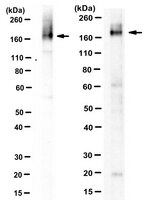ABT1834-25UL Sigma-AldrichAnti-Neurexin-1
Anti-Neurexin-1, Cat. No. ABT1834, is a chicken polyclonal antibody that detects Neurexin-1 and is tested for use in Electron Microscopy, Immunofluorescence, and Western Blotting.
More>> Anti-Neurexin-1, Cat. No. ABT1834, is a chicken polyclonal antibody that detects Neurexin-1 and is tested for use in Electron Microscopy, Immunofluorescence, and Western Blotting. Less<<Recommended Products
Overview
| Replacement Information |
|---|
| References |
|---|
| Product Information | |
|---|---|
| Format | Purified |
| Presentation | Purified chicken polyclonal antibody in buffer containing 50 mM HEPES pH 7.4, 150 mM NaCl, 20% Glycerol with 0.02% sodium azide with 20% glycerol. |
| Quality Level | MQ200 |
| Physicochemical Information |
|---|
| Dimensions |
|---|
| Materials Information |
|---|
| Toxicological Information |
|---|
| Safety Information according to GHS |
|---|
| Safety Information |
|---|
| Packaging Information | |
|---|---|
| Material Size | 25 µL |
| Transport Information |
|---|
| Supplemental Information |
|---|
| Specifications |
|---|
| Global Trade Item Number | |
|---|---|
| Catalog Number | GTIN |
| ABT1834-25UL | 04065269135081 |
Documentation
Anti-Neurexin-1 SDS
| Title |
|---|
Anti-Neurexin-1 Certificates of Analysis
| Title | Lot Number |
|---|---|
| Anti-Neurexin-1 - Q3987836 | Q3987836 |














